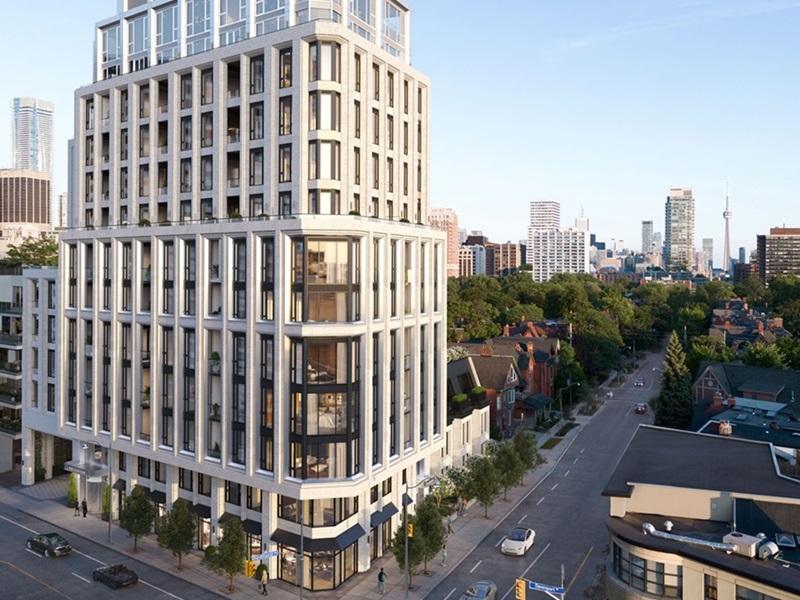
Michael Brooks, the CEO of REALPAC. (Courtesy REALPAC)
REALPAC is asking provincial governments to work collaboratively with both affected commercial tenants and property owners to create rent support programs, instead of banning evictions during the COVID-19 pandemic.
While responsible and empathetic commercial property owners have been working to support and sustain tenants affected by the pandemic fallout, some property owners are shouldering all, or part of, the burden of tenants’ lost revenues through delinquent rent payments.
There’s no doubt many tenants, particularly retailers and restaurants, are suffering these days. However, building owners also have to cover mortgage payments, employee salaries, property taxes, insurance costs and operating expenses.
“Governments need to understand that commercial property owners have been impacted as well, and not just tar them all with the bad actor brush like (Ontario) Premier (Doug) Ford has been doing and now (Toronto) Mayor (John) Tory is doing,” REALPAC chief executive officer Michael Brooks told RENX.
Retail sector is hurting the most
REALPAC, the national industry association representing owners of commercial real estate, surveyed rent payments for different asset classes in April and May. It will repeat the survey later this month.
National rent delinquencies for shopping centre tenants stood at 64 per cent for May, a 20 per cent increase over April.
For open-air malls and strip commercial centres, there was a 41 per cent rent delinquency rate in May. That was an 11 per cent increase over April.
With retail hurting so badly, it doesn’t seem like there would be a huge demand for space opened up by evictions. However, Brooks said keeping existing tenants in place isn’t always the best option for property owners and operators.
“There’s always turnover in the retail market,” he said. “I’m not saying there’s a waiting list of retail tenants, but there might be many interested in starting a new retail business and looking for space coming out of the pandemic.
“There may be other tenants, who have been problem tenants before the pandemic, that landlords are less interested in carrying through to the other side.
“Then, of course, there may be a few sites that are development sites that are better vacant than tenanted.”
Property owners collected 94.9 per cent of office rents in April, which dropped to 92.1 per cent in May.
Collections for large-bay industrial tenants were 96 per cent in April and 94 per cent in May, while those numbers dropped to 84 per cent and 82 per cent, respectively, for small-bay industrial tenants.
“I think most people are nervous about it getting worse unless the economy can partially reopen and these tenants can get back to work,” said Brooks. “Their supply chains are all disrupted and their ability to operate is going to be constrained.”
Landlord and government initiatives
Most REALPAC members have been offering rent deferrals of a few months to tenants unable to pay. Brooks believes many of those will be extended if businesses remain closed.
“Given the amount of rent deferred, it is highly likely that some of it will have to be forgiven at some point.”
Brooks appreciates the federal government has moved quickly to create programs, including Canada Emergency Commercial Rent Assistance (CECRA), to help small businesses.
However, he said funding CECRA through landlords has been problematic, detailed information was initially lacking, and there have been technical issues with the rollout.
REALPAC is advocating for the rapid creation of a rent bank, supported by provincial governments for affected tenants, and tailored to those genuinely in need and unable to quickly recover.
Brooks said a problem with CECRA is that it has a needs test (tenants must prove a 70 per cent drop in revenue), and a size test (maximum annual revenues of less than $20 million), but not a means test.
“There are some tenants who could have a very strong balance sheet, clearly be able to sustain themselves through the downturn, but either choose not to pay rent or want to claim CECRA.
“The rent bank wouldn’t arbitrarily limit support to those who are down 70 per cent, could provide funding to those who are down a lesser amount, could provide funding to those whose annual revenues are above $20 million, and could provide support to franchisees where the franchisor isn’t applying.
“Most importantly, it would screen out free riders and take the landlord out of the equation. Then those most in need — say, a small tenant — could take control of its destiny by receiving funding from the rent bank.”
Commercial and residential evictions
Commercial eviction moratoriums are in place in New Brunswick, Nova Scotia and British Columbia. Ford’s Conservative government in Ontario announced Monday it plans to legislate a three-month ban, and there’s talk of further bans being instituted by Quebec and Alberta.
“There’s no point having a commercial evictions moratorium because it just emboldens tenants to unilaterally withhold rent,” Brooks said. “Depriving landlords of their remedies could be the difference between a landlord being able to keep a property and defaulting on a mortgage and losing the property and their equity.”
Some provinces have also banned residential tenant evictions during the crisis. Brooks acknowledges the REALPAC apartment survey results showed rent collections around 97 per cent for April and May, but that still means a lot of households either didn’t, or couldn’t, pay.
“I do think that CERB (Canada Emergency Response Benefit) is supporting these higher levels of rent collections so far. If CERB is withdrawn, rental arrears could grow significantly.”
REALPAC’s back-to-business strategy
Brooks thinks REALPAC members are generally doing well overall considering the current uncertainty.
“Everybody is super engaged and busy managing their portfolios, dealing with tenants, filtering rent deferral requests, and thinking about the new normal and what they have to do around health and safety for their premises coming out of the pandemic.
“They’re all really good managers and they are focused on their businesses.”
Nevertheless, REALPAC is in the early stages of creating a government submission with ideas to restart the economy which it wants to quickly put together. Among items the association is considering are:
* speeding up development approvals;
* funding infrastructure development;
* funding net-zero demonstration projects;
* increasing the sale of government land to the private sector for development;
* assisting retirement communities and long-term care homes;
* and offering financial incentives to construction companies, which often pay for supplies, equipment and labour up front and may not get their first payment for six months.
“There’s a shopping list of things we could do,” said Brooks. “We’re sorting through some international research to see who’s doing what and how it’s been received, because some economies are opening up ahead of ours.”
Focus on diversity, equity and inclusion
With the recent demonstrations fueled by the death of George Floyd at the hands of police, and increasing attention being paid to issues of race, Brooks said REALPAC also plans to step up the diversity, equity and inclusion initiative it launched in late 2017.
“We’ve changed our board composition to get more females and visible minorities on our board. We changed our bylaws to allow that by increasing our board size to 10. We got all of our board to sign on to the panel pledge to not appear on a panel that isn’t diverse.”
REALPAC held a conference last year with female, visible minority and lesbian, gay, bisexual, transgender and queer or questioning-themed panels.
It had scheduled a similar event for June 19 that was cancelled due to the coronavirus, so there are plans to hold a webinar instead.
REALPAC has 109 member companies, including most domestic real estate investment trusts, as well as pension funds, private companies, fund managers, asset managers, developers, government real estate agencies, lenders, investment dealers, brokerages, consultants, data providers and large general contractors.
Members represent the office, retail, industrial, apartment, hotel and seniors residence sectors across the country.
RELATED ARTICLES:
* COVID-19 and the CECRA Program application process explained
* Asset management: Pandemic forces major changes
* Most real estate will emerge OK post-pandemic: Benjamin Tal
* Retail industry has ‘never’ faced a threat like COVID-19







